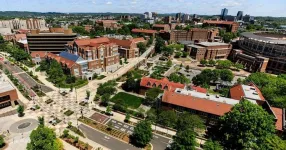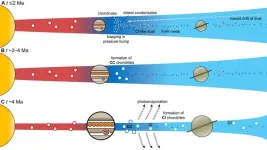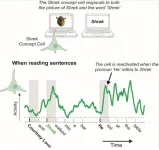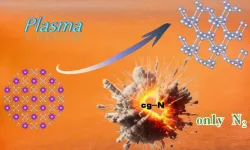(Press-News.org) Irvine, Calif., Sept. 27, 2024 — Research from the University of California, Irvine has revealed how disruption of the circadian clock, the body’s internal, 24-hour biological pacemaker, may accelerate the progression of colorectal cancer by affecting the gut microbiome and intestinal barrier function. This discovery offers new avenues for prevention and treatment strategies.
The study, published online today in the journal Science Advances, offers a more comprehensive understanding of how important changes occur in the function and composition of the gut microbiome when the circadian clock is disturbed in the presence of colorectal cancer.
“There is an alarming rise in early-onset colorectal cancer in adults under the age of 50,” said corresponding author Selma Masri, associate professor of biological chemistry. “Circadian misalignment through extended light exposure, late-night meals and other environmental factors could [be] driving these cases. Our study suggests that clock disruption, particularly through lifestyle choices, may play a significant role in gut health and, subsequently, cancer risk.”
Previous research has shown that disturbances to the circadian clock can influence the progression of colorectal cancer, but until now, how the biological clock and cancer impact the gut microbiome was unclear. Using colorectal cancer mouse models, the team found that when the circadian clock is disrupted, the diversity and abundance of gut bacteria change, and this is further exacerbated by cancer development.
Researchers also identified notable alterations in the microbial pathways involved in the metabolism of nucleic acids, amino acids and carbohydrates. These functional changes were linked to reduced levels of intestinal mucus, which normally protects the gut lining from harmful bacteria, suggesting that the circadian clock is crucial for maintaining barrier integrity. Increased permeability of the intestinal lining allows toxins and bacteria to enter the bloodstream, potentially accelerating cancer progression.
“While these findings are important, more work needs to be done,” Masri said. “In particular, we now want to know if changes in the timing and abundance of certain gut bacteria could directly lead to colorectal cancer development over time. Long-term studies will be critical in determining whether circadian misalignment drives cancer and how we might prevent it in the future. Deeper insights into how the body’s internal clock shapes the gut’s ecosystem could pave the way for treatments that not only address cancer but also improve overall gut health.”
The study was led by Rachel Fellows, a postdoctoral fellow in biological chemistry. Other team members included Assistant Professors Marcus M. Seldin and Nicholas R. Pannunzio; postdoctoral fellow Sung Kook Chun; graduate students Alisa L. Mahieu, Bridget Fortin and Wei A. Song; and associate specialist Natalie Larson – all from the School of Medicine’s Department of Biological Chemistry.
This work was supported by grants from the National Institutes of Health, the Concern Foundation and Johnson & Johnson, among others. See the study for a full list.
About the University of California, Irvine: Founded in 1965, UC Irvine is a member of the prestigious Association of American Universities and is ranked among the nation’s top 10 public universities by U.S. News & World Report. The campus has produced five Nobel laureates and is known for its academic achievement, premier research, innovation and anteater mascot. Led by Chancellor Howard Gillman, UC Irvine has more than 36,000 students and offers 224 degree programs. It’s located in one of the world’s safest and most economically vibrant communities and is Orange County’s second-largest employer, contributing $7 billion annually to the local economy and $8 billion statewide. For more on UC Irvine, visit www.uci.edu.
Media access: Radio programs/stations may, for a fee, use an on-campus studio with a Comrex IP audio codec to interview UC Irvine faculty and experts, subject to availability and university approval. For more UC Irvine news, visit news.uci.edu. Additional resources for journalists may be found at https://news.uci.edu/media-resources.
END
Circadian disruption, gut microbiome changes linked to colorectal cancer progression
Findings by UC Irvine researchers may lead to new prevention, treatment strategies
2024-09-27
ELSE PRESS RELEASES FROM THIS DATE:
Grant helps UT develop support tool for extreme weather events
2024-09-27
The University of Tennessee and the UT Institute of Agriculture have received a $434,038 Seeding Solutions grant from the Foundation for Food & Agriculture Research (FFAR) to develop and test a decision support tool for farmers to better manage crop production from risks of extreme weather events across the Tennessee River Basin and surrounding southeast US regions.
UT is providing matching funds for a total investment of $966,119 over the three-year project.
The U.S. Department of Agriculture estimates that extreme weather is responsible for 90% of crop losses. These estimates are generally based on annual climate conditions. ...
Autonomous vehicles can be imperfect — As long as they’re resilient
2024-09-27
Researchers from three of Virginia’s premier universities, including the University of Virginia’s Homa Alemzadeh, aim to take the risk out of self-driving vehicles by overcoming inevitable computer failures with good engineering.
The trio will share a $926,737 National Science Foundation award to identify when and where autonomous vehicle systems are most vulnerable to safety-critical failures. They plan to use this knowledge to design ways to efficiently mitigate potential safety hazards and enhance the overall system resilience.
Alemzadeh, an associate professor of electrical and computer engineering in UVA’s School of Engineering and Applied ...
Asteroid Ceres is a former ocean world that slowly formed into a giant, murky icy orb
2024-09-27
Since the first sighting of the first-discovered and largest asteroid in our solar system was made in 1801 by Giuseppe Piazzi, astronomers and planetary scientists have pondered the make-up of this asteroid/dwarf planet. Its heavily battered and dimpled surface is covered in impact craters. Scientists have long argued that visible craters on the surface meant that Ceres could not be very icy.
Researchers at Purdue University and the NASA's Jet Propulsion Lab (JPL) now believe Ceres is a very icy ...
McMaster researchers discover what hinders DNA repair in patients with Huntington’s Disease
2024-09-27
Researchers with McMaster University have discovered that the protein mutated in patients with Huntington’s Disease doesn't repair DNA as intended, impacting the ability of brain cells to heal themselves.
The research, published in PNAS on Sept. 27, 2024, found that the huntingtin protein helps create special molecules that are important for fixing DNA damage. These molecules, known as Poly [ADP-ribose] (PAR), gather around damaged DNA and, like a net, pull in all the factors needed for the repair process.
In people with Huntington’s Disease, however, the research found that the mutated version of this protein doesn’t function properly ...
Estrogens play a hidden role in cancers, inhibiting a key immune cell
2024-09-27
DURHAM, N.C. – Estrogens are known to drive tumor growth in breast cancer cells that carry its receptors, but a new study by Duke Cancer Institute researchers unexpectedly finds that estrogens play a role in fueling the growth of breast cancers without the receptors, as well as numerous other cancers.
Appearing Sept. 27 in the journal Science Advances, the researchers describe how estrogens not only decrease the ability of the immune system to attack tumors, but also reduce the effectiveness of immunotherapies that are used to treat many cancers, notably triple-negative breast cancers. Triple-negative ...
A new birthplace for asteroid Ryugu
2024-09-27
In December 2020 the space probe Hayabusa 2 brought samples of asteroid Ryugu back to Earth. Since then, the few grams of material have been through quite a lot. After initial examinations in Japan, some of the tiny, jet-black grains traveled to research facilities around the world. There they were measured, weighed, chemically analyzed and exposed to infrared, X-ray and synchroton radiation, among other things. At the MPS, researchers examine the ratios of certain metal isotopes in the samples, as in the current study. Scientists refer to isotopes as variants of the same element that differ only in the number of neutrons in the nucleus. Investigations ...
How are pronouns processed in the memory-region of our brain?
2024-09-27
A new study shows how individual brain cells in the hippocampus respond to pronouns. “This may help us unravel how we remember what we read.”
Read the following sentence: “Donald Trump and Kamala Harris walked into the bar, she sat down at a table.” We all immediately know that it was Kamala who sat at the table, not Donald. Pronouns like “she” help us to understand language, but pronouns can have multiple meanings. Depending on the context, we understand who the pronoun is referring to. But ...
Researchers synthesize high-energy-density cubic gauche nitrogen at atmospheric pressure
2024-09-27
Recently, a research group led by Prof. WANG Xianlong from the Hefei Institutes of Physical Science of the Chinese Academy of Sciences, successfully synthesized high-energy-density materials cubic gauche nitrogen (cg-N) at atmospheric pressure by treating potassium azide (KN3) using the plasma-enhanced chemical vapour deposition technique (PECVD).
The research results were published in Science Advances.
Cg-N is a pure nitrogen material consisting of nitrogen atoms bonded by N-N single bonds, resembling the structure of diamond. It has attracted attention because it has a high-energy-density and produces only nitrogen gas when it decomposes. ...
Ancient sunken seafloor reveals earth’s deep secrets
2024-09-27
University of Maryland scientists uncovered evidence of an ancient seafloor that sank deep into Earth during the age of dinosaurs, challenging existing theories about Earth’s interior structure. Located in the East Pacific Rise (a tectonic plate boundary on the floor of the southeastern Pacific Ocean), this previously unstudied patch of seafloor sheds new light on the inner workings of our planet and how its surface has changed over millions of years. The team’s findings were published in the journal Science Advances on September 27, 2024.
Led by geology postdoctoral researcher Jingchuan Wang, the team used innovative seismic imaging techniques to ...
Automatic speech recognition learned to understand people with Parkinson’s disease — by listening to them
2024-09-27
As Mark Hasegawa-Johnson combed through data from his latest project, he was pleasantly surprised to uncover a recipe for Eggs Florentine. Sifting through hundreds of hours of recorded speech will unearth a treasure or two, he said.
Hasegawa-Johnson leads the Speech Accessibility Project, an initiative at the University of Illinois Urbana-Champaign to make voice recognition devices more useful for people with speech disabilities.
In the project’s first published study, researchers asked an automatic ...
LAST 30 PRESS RELEASES:
New knowledge on heritability paves the way for better treatment of people with chronic inflammatory bowel disease
Under the Lens: Microbiologists Nicola Holden and Gil Domingue weigh in on the raw milk debate
Science reveals why you can’t resist a snack – even when you’re full
Kidney cancer study finds belzutifan plus pembrolizumab post-surgery helps patients at high risk for relapse stay cancer-free longer
Alkali cation effects in electrochemical carbon dioxide reduction
Test platforms for charging wireless cars now fit on a bench
$3 million NIH grant funds national study of Medicare Advantage’s benefit expansion into social supports
Amplified Sciences achieves CAP accreditation for cutting-edge diagnostic lab
Fred Hutch announces 12 recipients of the annual Harold M. Weintraub Graduate Student Award
Native forest litter helps rebuild soil life in post-mining landscapes
Mountain soils in arid regions may emit more greenhouse gas as climate shifts, new study finds
Pairing biochar with other soil amendments could unlock stronger gains in soil health
Why do we get a skip in our step when we’re happy? Thank dopamine
UC Irvine scientists uncover cellular mechanism behind muscle repair
Platform to map living brain noninvasively takes next big step
Stress-testing the Cascadia Subduction Zone reveals variability that could impact how earthquakes spread
We may be underestimating the true carbon cost of northern wildfires
Blood test predicts which bladder cancer patients may safely skip surgery
Kennesaw State's Vijay Anand honored as National Academy of Inventors Senior Member
Recovery from whaling reveals the role of age in Humpback reproduction
Can the canny tick help prevent disease like MS and cancer?
Newcomer children show lower rates of emergency department use for non‑urgent conditions, study finds
Cognitive and neuropsychiatric function in former American football players
From trash to climate tech: rubber gloves find new life as carbon capturers materials
A step towards needed treatments for hantaviruses in new molecular map
Boys are more motivated, while girls are more compassionate?
Study identifies opposing roles for IL6 and IL6R in long-term mortality
AI accurately spots medical disorder from privacy-conscious hand images
Transient Pauli blocking for broadband ultrafast optical switching
Political polarization can spur CO2 emissions, stymie climate action
[Press-News.org] Circadian disruption, gut microbiome changes linked to colorectal cancer progressionFindings by UC Irvine researchers may lead to new prevention, treatment strategies






